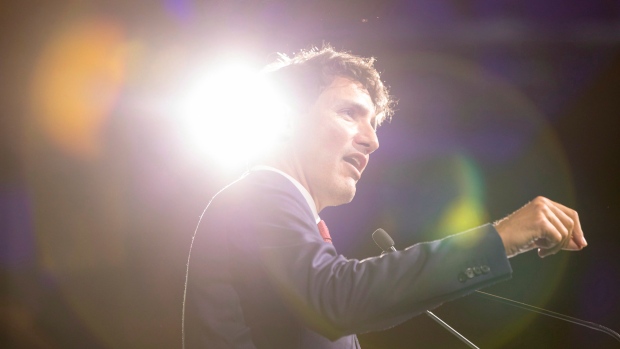Oct 1, 2018
Trudeau scores economic wins with NAFTA deal, LNG investments
, Bloomberg News

In less than 12 hours, Prime Minister Justin Trudeau scored two of the biggest economic wins of his political career.
The Canadian leader reached an agreement with President Donald Trump late Sunday to join a new Nafta trade deal with the U.S. and Mexico, ending more than a year of uncertainty for the nation’s businesses. Hours earlier, Bloomberg News reported that a Royal Dutch Shell Plc-led group is poised to announce Monday that it’s moving forward on a $40 billion natural gas terminal in Canada, one of the country’s biggest construction projects.
The agreements mark major successes on two critical fronts for Canada -- trade and energy -- that have acted as drags on the nation’s economy, and were the biggest points of vulnerability to Trudeau as opposition parties begin to attack his economic record ahead of elections next year. The loonie rallied on the Nafta deal.
“The success or failure of a new NAFTA regime could very likely make or break the Trudeau Liberals,” pollster Nik Nanos of Nanos Research said.
Despite an economy that’s performing well, Trudeau has suffered heavy blows on core commercial files in recent months. Companies have been pressing him aggressively for tax cuts, claiming they are struggling to compete for investments after the U.S. cut corporate tax rates this year. The Group of Seven summit he hosted in June, meant to be a showcase of Canada’s global leadership, was blown up by Trump, who called Trudeau “dishonest and weak,” prompting questions about his strategy to handle the capricious U.S. president.
Exclude Canada
Then in late August, a surprise U.S.-Mexico trade pact threatened to exclude Canada from a Nafta rewrite, only to be followed a few days later by a court decision that sideswiped a key pipeline he spent billions to nationalize. The setbacks triggered a national debate over whether the country’s heavy regulatory framework was undermining its ability to attract big investments, and whether Trudeau had a handle on key economic files.
The Nafta deal and energy investment should quell some of the criticism.
“Bread and butter issues like jobs and the economy are most likely to decide the next federal election in Canada,” said Nanos.
NAFTA
The trade agreement with the U.S. and Mexico removes the biggest risk to the nation’s economy, particularly with threats by Trump to impose auto tariffs if Canada didn’t sign. Canadian auto exports up to a certain threshold will not be impacted by any U.S. tariffs on automobiles, a key reprieve for Canada as part of the Nafta deal.
Current Canadian production levels of roughly 1.8 million units would not be affected by any tariffs. The levies would not kick in until Canadian auto exports to the U.S. topped 2.6 million units annually, according to people familiar with the deal.
Trudeau welcomed the trade pact on Twitter.
The Conference Board of Canada recently estimated that failing to renew the trade pact coupled by auto tariffs would curb growth by 0.6 percentage points next year and another 0.7 points in 2020, nearly a third of the expected pace of expansion.
JPMorgan Chase & Co. forecast last week the Canadian dollar could crumble nearly 10 percent against the dollar in the worst case “NoFTA” scenario. Canada sends about three quarters of all its exports to the U.S.
With the tide turning in recent days however, the Canadian dollar touched its strongest level since May, strengthening 0.57 per cent to $1.2837 in trading late Sunday, paring its 2018 decline. The loonie gained 1 per cent on Friday to close out a quarter in which it was one of only four G-10 currencies to rally against the greenback.
The Shell LNG investment will give a jolt to the country’s beleaguered energy sector. It has suffered from discounted oil and gas prices relative to global benchmarks, along with regulatory hurdles and an exodus of investment by companies such as ConocoPhillips. LNG Canada is set to be the nation’s largest infrastructure project ever, and will be able to send cargoes from Kitimat, British Columbia to Tokyo in about eight days versus 20 days from the U.S. Gulf.
LNG Canada -- comprised of Shell, Malaysia’s Petroliam Nasional Bhd, Mitsubishi Corp., PetroChina Co. and Korea Gas Corp. -- is set to announce a final investment decision on the project as early as Monday, said people with direct knowledge of the plans, who asked not to be identified because the matter isn’t public.
LNG Canada wasn’t the only development in the energy sector on the weekend. Interest in the oil patch is heating up with a hostile takeover bid for MEG Energy Corp. by Husky Energy Inc., the oil and gas company controlled by Hong Kong billionaire Li Ka-shing. Foreign investors have been largely pulling out of Canada’s oil sands, concerned about the higher costs of production and lack of new pipeline capacity to move the crude.
2019 Election
Canada’s elections often hinge largely on the economy -- the opposition Conservatives are hoping to unseat Trudeau by attacking him on those issues. A Nafta deal, avoiding auto tariffs, and renewed life in the energy sector will buoy his fortunes.
Trudeau has seen recent Canadian provincial elections shy away from his centrist Liberal Party’s provincial wings, but has also seen his poll numbers remain steady federally. He is buoyed in part by a partially fractured conservative movement and an under-performing New Democratic Party, the other of Canada’s three major national parties.
How Trudeau’s economic exploits will be viewed remains to be seen. And any concessions he made to get a NAFTA deal done could generate a push back.
“Canadians are cross pressured between the pressure to have a deal critical to prosperity and stability while at the same time not making it look like a capitulation to U.S. President Trump,” Nanos said.





